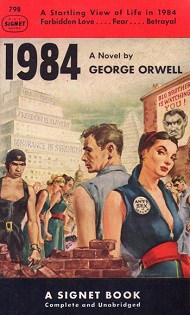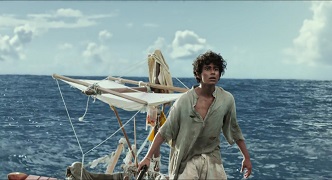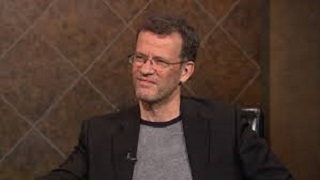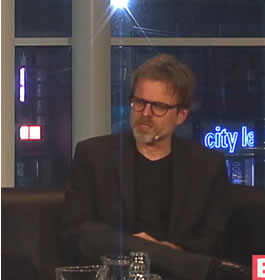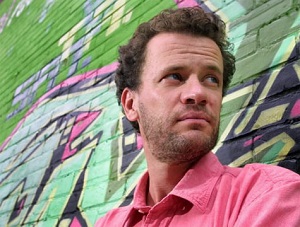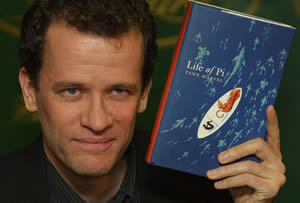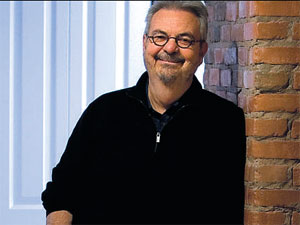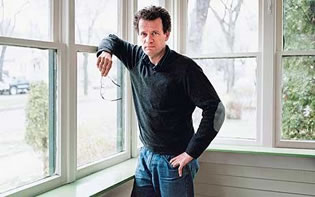De Canadese schrijver Yann Martel werd op 25 juni 1963 geboren in Salamanca. Zie ook alle tags voor Yann Martel op dit blog.
UIt: The High Mountains of Portugal
« Tomás decides to walk.
From his modest flat on Rua São Miguel in the ill-famed Alfama district to his uncle’s stately estate in leafy Lapa, it is a good walk across much of Lisbon. It will likely take him an hour. But the morning has broken bright and mild, and the walk will soothe him. And yesterday Sabio, one of his uncle’s servants, came to fetch his suitcase and the wooden trunk that holds the documents he needs for his mission to the High Mountains of Portugal, so he has only himself to convey.
He feels the breast pocket of his jacket. Father Ulisses’ diary is there, wrapped in a soft cloth. Foolish of him to bring it along like this, so casually. It would be a catastrophe if it were lost. If he had any sense he would have left it in the trunk. But he needs extra moral support this morning, as he does every time he visits his uncle.
Even in his excitement he remembers to forgo his regular cane and take the one his uncle gave him. The handle of this cane is made of elephant ivory and the shaft of African mahogany, but it is unusual mainly because of the round pocket mirror that juts out of its side just beneath the handle. This mirror is slightly convex, so the image it reflects is quite wide. Even so, it is entirely useless, a failed idea, because a walking cane in use is by its nature in constant motion, and the image the mirror reflects is therefore too shaky and fleeting to be helpful in any way. But this fancy cane is a custom-made gift from his uncle, and every time he pays a call Tomás brings it.
He heads off down Rua São Miguel onto Largo São Miguel and then Rua de São João da Praça before turning onto Arco de Jesus—the easy perambulation of a pedestrian walking through a city he has known his whole life, a city of beauty and bustle, of commerce and culture, of challenges and rewards. On Arco de Jesus he is ambushed by a memory of Dora, smiling and reaching out to touch him. For that, the cane is useful, because memories of her always throw him off balance.
“I got me a rich one,” she said to him once, as they lay in bed in his flat.
“I’m afraid not,” he replied. “It’s my uncle who’s rich. I’m the poor son of his poor brother. Papa has been as unsuccessful in business as my uncle Martim has been successful, in exact inverse proportion.”
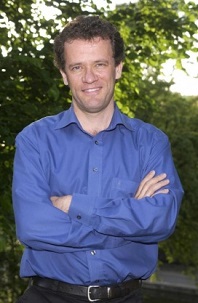
Yann Martel (Salamanca, 25 juni 1963)
De Nederlandse schrijver en vertaler Rob van Essen werd op 25 juni 1963 geboren in Amstelveen. Zie ook alle tags voor Rob van Essen op dit blog.
Uit: Visser
“Anders denk je maar dat Ajax morgen tegen fc Zwoldrecht komt spelen. Kom op, nog eens.’ Hij zet nog eens in, en een paar jongens beginnen voorzichtig mee te zingen. Er wordt een bierfles naar het podium gegooid die tegen de kale achterwand uit elkaar spat en een paar mensen steken hun middelvinger op naar het podium. Het gezang zwelt aan. Als Jonathan voor de derde keer inzet, wordt er uit volle borst meegezongen. Een aantal jongens in leren jasjes hossen met de armen om elkaars schouders rond. ‘Fascisten, fascisten!’ gilt iemand. Midden in de zaal wordt geduwd en getrokken. Wegereef begint iets in Jacobs oor te schreeuwen en Jacob werkt zich door de zingende menigte bij hen vandaan, verder naar voren. `Het zijn de moslims!’ roept een student die vlak voor het podium staat. Jonathan buigt zich naar hem toe. ‘Natuurlijk niet!’ roept hij terwijl het gezang en de vechtpartijen in de zaal gewoon doorgaan. Hij schreeuwt iets over vlieglessen en wolkenkrabbers.
`Kutkankermoslims,’
beginnen een paar andere studenten te zingen,
`0, o, o, kutkankermoslims, Kutkankermóslims, 0, o, o, kutkankermoslims.’
Als het groepje Marokkaanse jongens op hen af komt, vallen ze stil. Jonathan zet weer in, gevolgd door een groot deel van de zaal.
`Kutkankerjoden,’ 0, o, o, kutkankerjoden.’
De Marokkanen delen klappen uit aan de studenten. Jacob krijgt een fles bier in zijn handen gedrukt door Clarissa. ‘Het gaat over jou!’ roept ze. ‘Hij is goed, hè?’ Achter Clarissa staan een kale jongen in een lange leren jas en een jongen met een rode hanenkam tegen elkaar te schreeuwen.”
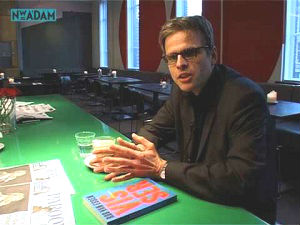
Rob van Essen (Amstelveen, 25 juni 1963)
De Britse schrijver George Orwell (pseudoniem van Eric Arthur Blair) werd op 25 juni 1903 geboren in Motihari, India. Zie ook alle tags voor George Orwell op dit blog.
Uit: 1984
“Winston stroked his nose gently with a paper clip. In the cubicle across the way Comrade Tillotson was still crouching secretively over his speakwrite. He raised his head for a moment: again the hostile spectacle-flash. Winston wondered whether Comrade Tillotson was engaged on the same job as himself. It was perfectly possible. So tricky a piece of work would never be entrusted to a single person; on the other hand, to turn it over to a committee would be to admit openly that an act of fabrication was taking place. Very likely as many as a dozen people were now working away on rival versions of what Big Brother had actually said. And presently some master brain in the Inner Party would select this version or that, would re-edit it and set in motion the complex processes of cross-referencing that would be required, and then the chosen lie would pass into the permanent records and become truth.
Winston did not know why Withers had been disgraced. Perhaps it was for corruption or incompetence. Perhaps Big Brother was merely getting rid of a too-popular subordinate. Perhaps Withers or someone close to him had been suspected of heretical tendencies. Or perhaps—what was likeliest of all—the thing had simply happened because purges and vaporizations were a necessary part of the mechanics of government. The only real clue lay in the words “refs unpersons,” which indicated that Withers was already dead. You could not invariably assume this to be the case when people were arrested. Sometimes they were released and allowed to remain at liberty for as much as a year or two years before being executed. Very occasionally some person whom you had believed dead long since would make a ghostly reappearance at some public trial where he would implicate hundreds of others by his testimony before vanishing, this time forever. Withers, however, was already an unperson. He did not exist; he had never existed. Winston decided that it would not be enough simply to reverse the tendency of Big Brother’s speech. It was better to make it deal with something totally unconnected with its original subject.”
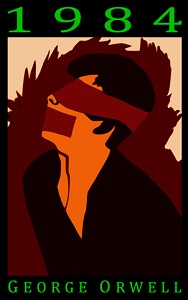
George Orwell (25 juni 1903 – 21 januari 1950)
Cover
De Canadese schrijver Michel Tremblay werd geboren in Quebec op 25 juni 1942. Zie ook alle tags voor Michel Tremblay op dit blog.
Uit: Un ange cornu avec des ailes de tôle
« On dit que désirer est plus jouissant que posséder.
C’est faux pour les livres. Quiconque a senti cette chaleur au creux de l’estomac, cette bouffée d’excitation dans la région du cœur, ce mouvement du visage – un petit tic de la bouche, peut-être, un pli nouveau au front, les yeux qui fouillent, qui dévorent- au moment où on tient enfin le livre convoité, où on l’ouvre en le faisant craquer mais juste un peu pour “l’entendre”, quiconque a vécu ce moment de bonheur incomparable comprendra ce que je veux dire. Ouvrir un livre demeure l’un des gestes les plus jouissifs, les plus irremplaçables de la vie.
(…)
J’aime les livres, je I’ ai assez dit jusqu’ici, j’aime les palper,les feuilleter,les humer; j’aime les presser contre moi et les mordre; j’aime les malmener, les sentir vieillir entre mes doigts, les tacher de café- sans toutefois faire exprès-, y écraser de petits insectes, l’été, et les dépose n ‘importe où ils risquent de se salir, mais quand je vois pour la première fois un de mes livres à moi, un enfant que j’ai pensé,pondu, livré, l’émotion est tellement plus forte, la joie tellement plus vive, que le monde s ‘arrête littéralement de tourner. Je ressens une petite secousse comme lorsqu’un ascenseur s’arrête, mes genoux se dérobent, mon coeur tape du pied comme ma grand-mère Tremblay sur le balcon de la rue Fabre quand j ‘étais enfant, et chaque fois – ce livre-ci sera le quarantième -, je pense à maman qui n’a jamais su que j ‘écrivais, qui est partie doublement trop tôt: parce que je I’aimais et parce que je n’ai jamais pu lui confier les deux secrets de ma vie, mon orientation sexuelle et… Qu’aurait-elle dit en ouvrant le premier livre de son fils qui I’avait si souvent exaspérée?”
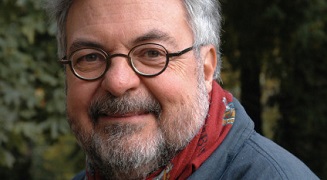
Michel Tremblay (Quebec, 25 juni 1942)
De Engelse schrijver Nicholas Mosley werd geboren op 25 juni 1923 geboren in Londen. Zie ook alle tags voor Nicholas Mosley op dit blog.
Uit: Efforts At Truth
“So I got the idea of trying to do some autobiographical writing that would examine what I was saying in my early novels, what was written in letters at the time, and what I remembered of my life, and consider what relation there was between the sort of novels I was writing and the sort of life I was leading. Because one of the things that had come to interest me was the way in which so many writers of my generation, and of a later generation in particular, were writing about life as an absolutely hopeless business where no one made any communication with anyone else and life was a very dismal affair, and yet they – these people, some of whom I knew – seemed to be leading a happy life, they seemed to be able to make communication with other people, they seemed to be okay. And yet they were writing about life as if it were an awful mess. So I was interested in that. Then, when I looked back on my early novels, I found that I was doing the same sort of thing. After I came back from the war, I wrote Spaces of the Dark, which is about a young man who has returned from the war, where things had gone wrong for him, and for whom things kept on going wrong at home. This wasn’t like my own experience. My own experience was that I’d got through the war okay, I’d been lucky. And when I got home I had a nice time. When I was twenty-four I married, and we were happy, and we went off on a long sort of working honeymoon. I was going to write my first novel, which I did.
Anyway, that was one of the things that interested me. Why do these people write novels about life being a mess, when in fact their lives, to a very large extent, don’t seem to be a mess. Then I wondered whether novel writing was actually putting up some sort of smokescreen, some sort of protection: you had to say life was a mess, because if you said life was not a mess then perhaps your luck would run out and you would become a mess. This would be rather like touching wood: you have to sort of get the worst out in novels, as some sort of self-protection. And yet at the same time, I thought my own novels – which were to a certain extent doing this – were also some desperate way of trying to break through the smokescreens and protections that one put up in ordinary life, or ordinary life put up around one. And so I thought I’d try to write about that.“
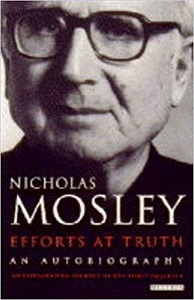
Nicholas Mosley (Londen, 25 juni 1923)
Cover
De Oostenrijkse dichteres Ingeborg Bachmann werd geboren op 25 juni 1926 in Klagenfurt. Zie ook alle tags voor Ingeborg Bachmann op dit blog.
Schwarzer walzer
Das Ruder setzt auf den Gong mit dem schwarzen Walzer ein,
Schatten mit stumpfen Stichen nähn die Gitarren ein.
Unter der Schwelle erglänzt im Spiegel mein finstres Haus,
Leuchter treten sich sanft die flammenden Spitzen aus.
Ueber die Klänge verhängt: Eintracht von Welle und Spiel;
immer entzieht sich der Grund mit einem anderen Ziel.
Schuld ich dem Tag das Marktgeld und den blauen Ballon –
Steinrumpf und Vogelschwinge suchen die Position
zum Pas de deux ihrer Nächte, lautlos mir zugewandt,
Venedig, gepfählt und geflügelt, Abend- und Morgenland.
Nur Mosaiken wurzeln und halten im Boden fest,
Säulen umtanzen die Bojen, Fratzen- und Freskenrest.
Kein August war geschaffen, die Löwensonne zu sehn,
schon am Eingang des Sommers liesz sie die Mähne wehn.
Denk dir abgöttische Helle, den Prankenschlag auf den Bug
und im Gefolge des Kiels den törichten Maskenzug,
überm ersäuften Parkett zu Spitze geschifft ein Tuch,
brackiges Wasser, die Liebe und ihren Geruch,
Introduktion, dann den Auftakt zur Stille und nichts nachher,
Pauken schlagende Ruder und die Coda vom Meer!
Aanroeping van de grote beer
Grote Beer, daal af, ruige nacht,
wolkenpelsdier met je oude ogen,
sterreogen,
door het struikgewas breken glinsterend
je poten met de klauwen,
sterreklauwen,
waakzaam hoeden wij de kudden,
echter in de ban van jou, en wantrouwen
je vermoeide flanken en je scherpe,
halfontblote tanden,
oude beer.
Een denneappel: jullie wereld.
Jullie: de schubben eraan.
Ik drijf ze, rol ze
van de dennen in het begin
naar de dennen aan het einde,
snuffel aan ze, proef ze in mijn bek
en pak ze met mijn poten.
Vrees of vrees niet!
Gooi in het kerkezakje en geef
de blinde man een goed woord,
dat hij de beer aan de lijn houdt.
En kruid de lammeren goed.
Het kan gebeuren dat deze beer
zich losrukt, niet meer dreigt
en op alle denneappels jaagt die van de bomen
zijn gevallen, van de grote, gevleugelde dennen
die uit het paradijs neerstortten.
Vertaald door Paul Beers en Isolde Quadflieg
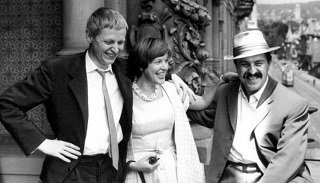
Ingeborg Bachmann (25 juni 1926 – 17 oktober 1973)
Hier tussen Hans Magnus Enzensberger en Gunter Grass
De Nederlandse dichter en schrijver Leendert Witvliet werd geboren in Werkendam op 25 juni 1936. Zie ook alle tags voor Leendert Witvliet op dit blog.
Al die oude gedichten
Obligate woorden,
woorden met spleen
in een schimmig en gestoken landschap
van nevel, mist en nutteloze regen,
de landerige herhaling van het nakijken.
Hoe door het opgeschoven raam
de lucht van de zomer binnendreef,
vergankelijk als geluiden
en het spokende relaas
van de gespleten vage man bij de molen,
die lucht aan flarden draaide.
Maar
hoe we liggen en niet liggen
in droomloos geworden ruimte.
Voor F.
Avonden in de tuin
een schemerlamp op de tafel
vader en moeder en vrienden kaartten
muggen dansten om de lamp
de lucht rook naar grolsch.
Achter de tuindeuren
wachtten de kinderen.
Alles was vrede
en iedereen was er nog,
al was het aan de rand.
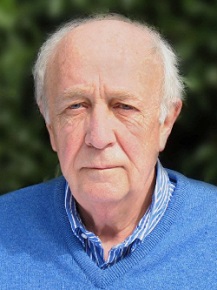
Leendert Witvliet (Werkendam, 25 juni 1936)
De Russische dichter en vertaler Arseny Alexandrovich Tarkovsky werd geboren op 25 juni 1907 in Elisavetgrad. Zie ook alle tags voor Arseny Tarkovsky op dit blog.
After The War
I
Like a tree on top of forest grass
Spreads its leafy hands through the leaves
And, leaning on a shrub, propagates
Its branches sideways, widthwise —
So I shot up gradually. My muscles
Swelled, my rib cage expanded. From the blue
Goblet with prickly alcohol, my lungs
Filled to the smallest alveoli, and my heart
Took blood from the veins and veins
Returned the blood, and took the blood again
And it was like a transfiguration
Of simple happiness and simple grief
In a prelude and fugue for organ.
II
I would be sufficient for all living things,
Both plants and people,
Who’d been dying somewhere near
And somewhere at the other end of the earth
In unimaginable suffering, like Marsyas,
Who was flayed alive. If I’d given them my life,
I would not become any poorer
In life, in myself, in my blood.
But I myself became like Marsyas. I’d long lived
Among the living, and became like Marsyas
Vertaald door Philip Metres en Dimitri Psurtsev
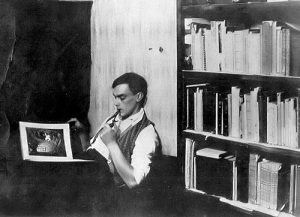
Arseny Tarkovsky (25 juni 1907 – 27 mei 1989)
De Amerikaanse schrijver, columnist en homoactivist Larry Kramer werd geboren in Bridgeport, Connecticut op 25 juni 1935. Zie ook alle tags voor Larry Kramer op dit blog.
Uit: Faggots
« I know it, too.” Sammy continued to marvel at such com-mon sense. Then he recollected the fairy business and asked: “Do you … do you look at me in the showers as much as I look at you?” “Yes. I do.” And Dunnie, again giving himself the look of the loved in that tilted mirror, further said: “I think sometimes we’re lucky to know certain things early, like being shown what’s in the crystal ball at the beginning of your life instead of at the end. I know I want to be looked at by everybody and to pass around my beauty … ,” at this point he took Sammy’s damp hand and used it to make his further illustrative point, “… and have everybody touching me all over and letting me do the same to them and … maybe we better not tell anybody about this Poor Sammy. He was not only on scholarship but was also getting very excited. His schoolmate, between reaching for the maternal brownies, was massaging his penis, now bulging mightily within Sammy’s only pair of gray-flannel trousers, which he had begged his mother and father to buy for him on the trip to Philadelphia at the start of term and he had summoned up all his cour-age to ask for them and to say that every boy in class had at least one pair except him and his dad had mumbled something about how the fucking scholarship Sammy had should include a gray-flannel-pants allowance but had bought them for the boy anyway and Sammy had never been able to wear them without a slight tinge of guilt and if Dunnie rubbed him anymore he might explode white stuff all over the gray and then he’d have to throw the pants away. “Please, Dunnie, could I … please… take off my gray flannels?” And that of course had been the beginning of the end, or of the beginning. It was only seconds before both boys were completely naked and opening themselves to the joys and conflicts redolent in this early tender moment of exploring themselves in the body of another, holding on to each other’s dickies as if they were holding on to their own. It was as if each were rather hungry from some already precocious deprivation now being at last fulfilled, their little hands grabbing their little things, Dunnie even returning kisses and not worrying that the lips, too, were Jewish. Unfortunately, Sammy could not contain his involuntary reflexes for too long and his little load of white stuff melded not with the gray flannels from the Broth-ers Brooks but with the brownies from the Mother Rosen. It came so suddenly, the spurt of liquid, that he looked down upon himself as it quivered out, then just sat there studying the improbable com-bination of semen and chocolate. Dunnie was also looking at the brownies rather strangely.”
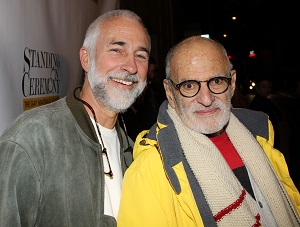
Larry Kramer (Bridgeport, 25 juni 1935)
Hier met echtgenoot David Webster (links)
Zie voor nog meer schrijvers van de 25e juni ook mijn blog van 25 juni 2017 deel 2.

